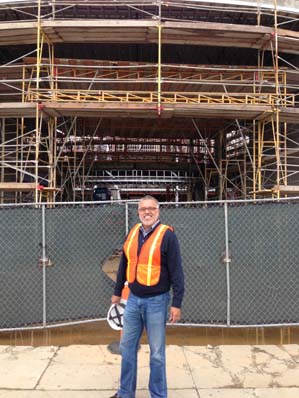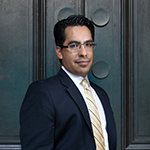
Michael Lizárraga grew up with a front-row seat to watching his father, David, grow the community-development organization TELACU through “sheer will” in its earliest years. Founded in 1968, Lizárraga’s father led the organization and its dedication to revitalize urban, underserved communities for more than 35 years as CEO. TELACU, which is based in California, includes more than 10 companies in the real-estate development, financial services, construction, and construction management sectors.
TELACU developed around Lizárraga’s father as an “iconic Latino leader” and has a unique approach to the modern-day business model. The federally chartered nonprofit community development corporation is committed to self-sustaining its mission by operating businesses primarily owned by the nonprofit. The company’s mission statement focuses on four cornerstones: service, empowerment, advancement, and the creation of self-sufficiency.
Though Lizárraga pursued studying business administration at the University of Southern California (USC) he did not express any interest in “following in dad’s footsteps.” Upon graduating from USC in 1985, Lizárraga went a more unconventional route: he bought a European car-repair shop.
Lizárraga credits much of his business savvy to those years as a small-business owner in Southern California. In 1990, Lizárraga came to TELACU to manage the company’s extensive commercial real-estate portfolio. Lizárraga recalls, “It was right at the beginning of our nation’s devastating savings and loan crisis, which was somewhat similar to our most recent financial system crisis during the Great Recession.”
Thanks to TELACU’s consistent track record in both banking and commercial real estate as well as the government’s aggressive minority contracting goals, it quickly became one of the largest FDIC contractors working out $13 billion in troubled commercial loans and real-estate projects across the country. “That ramped TELACU to a new level of financial services,” Lizárraga says. “Right after that period the board of directors told me they liked my approach and asked me to come to the home office.” Shortly thereafter Lizárraga was named president of TELACU Industries, the entity that controls TELACU’s for-profit businesses.
Lizárraga takes care to cultivate a culture that empowers every team member to fulfill TELACU’s mission statement in his or her own work. Lizárraga’s philosophy on work performance is that the past is not nearly as consequential as the future. “I’ve been a successful leader, but that may not buy me anything tomorrow.” Lizárraga prioritizes staying attuned to what is happening next. “You have to listen for what wants to happen. We have no shortage of opportunity,” Lizárraga says.
Michael’s Aha Moment
Tell us about the moment when you had a clear realization of what your direction should be (either personal or professional).
My “aha” moment was when I saw that the efforts of TELACU were related to empowering other human beings. I saw that what TELACU did really made a difference in the lives of other people. My a-ha moment was that there is a higher purpose to what we do. That higher purpose is the TELACU mission statement.
Among TELACU’s most notable accomplishments under Lizárraga’s leadership is the $3 billion worth of new school construction and modernization that has taken place over the last 10 years. Over the last five years, TELACU has doubled the number of low-income homes it services annually with energy-efficiency measures. Now 20,000 homes receive energy-efficiency measures per year at no cost to the low-income resident.
“Everything we do, by the nature of our business model, must have both an economic and social bottom line,” Lizárraga says, calling the organization’s principles “tools for prosperity.”
“If we create a job for someone, or make a loan to a small-business person, or give a scholarship to a first-generation college student, we have provided them with a tool to create a prosperous life for themselves,” he says. These tools allow TELACU’s beneficiaries the ability to develop and create a future of their own design, “with their own hands and ingenuity.”
While TELACU assists all regardless of their ethnic background, Lizárraga especially passionate about elevating the Hispanic community. “Following in my dad’s community development footsteps, the cause of empowering the Latino community is truly a part of our family’s DNA,” Lizárraga says.
Lizárraga credits this marvel with his commitment to accountability. “I’ve always seen myself as highly accountable to our board of directors. I always have people in my life to whom I’m accountable. I have observed many CEOs who resist accountability, but that’s a practice that I’ve instilled in my life.” Lizárraga sums it up as “TELACU builds two things: people and buildings. At a grand opening recently there was an 80-year-old senior citizen who told us her affordable apartment was the first new thing she ever had. TELACU is a part of meeting needs in our community. That is what wakes me up in the morning.”

